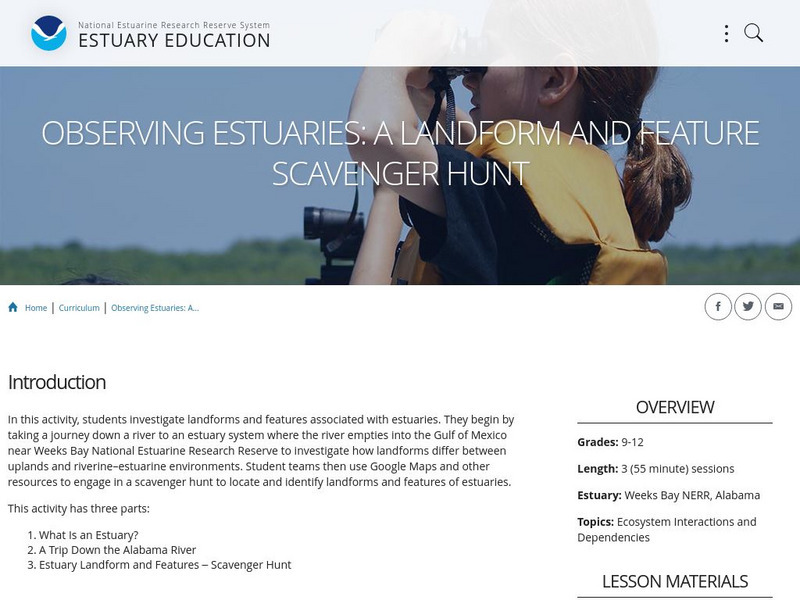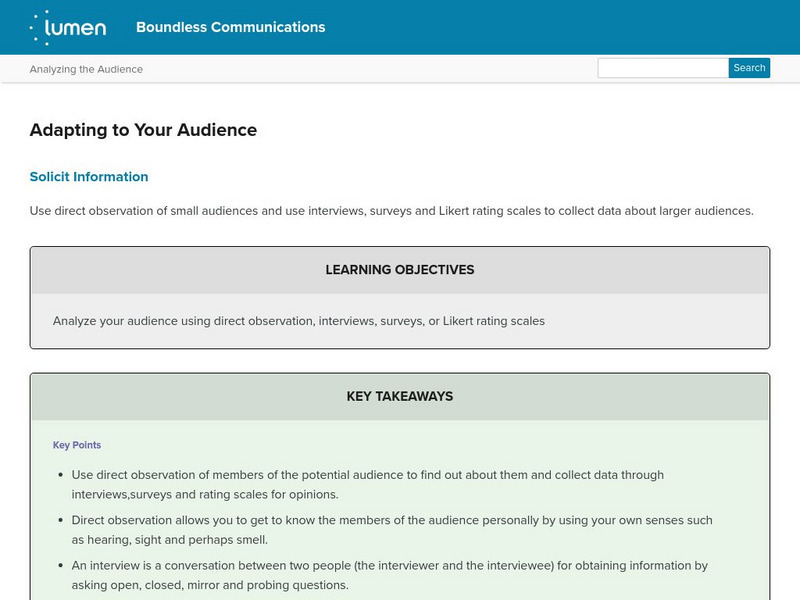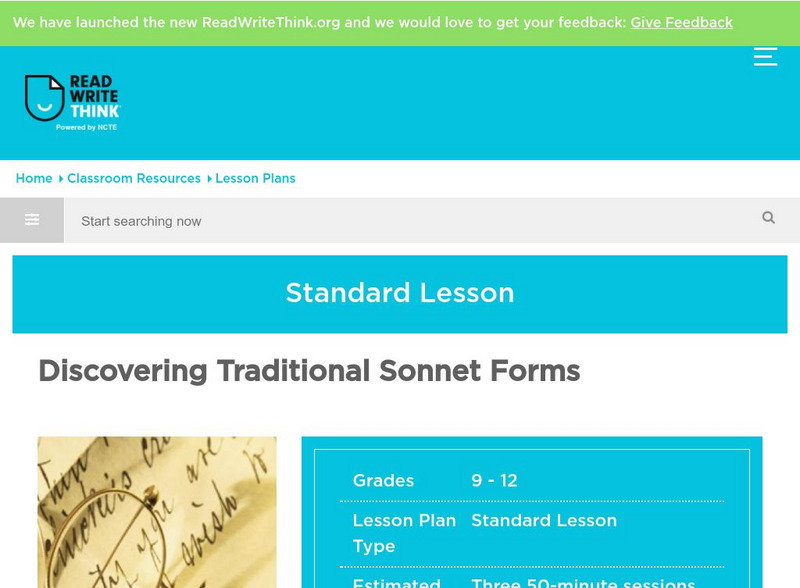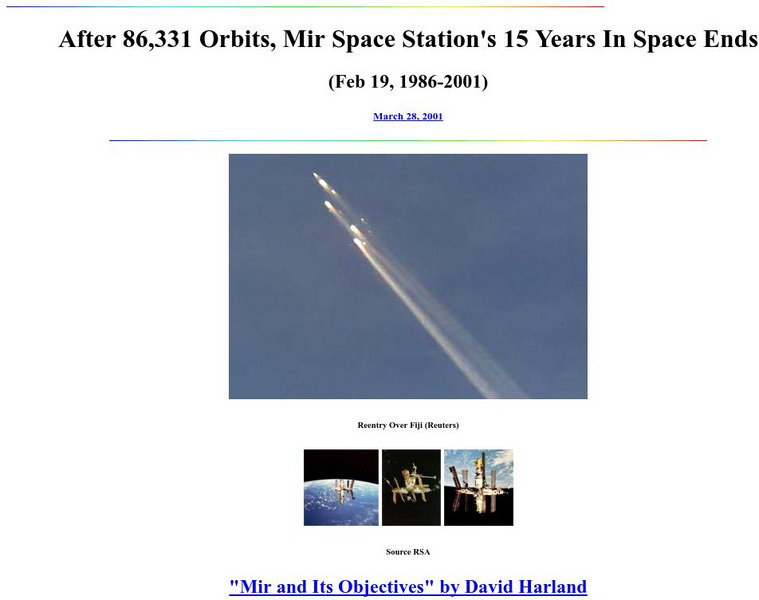BioEd Online
Bio Ed Online: The Science of Microbes: Observing Different Microbes
Students prepare slides of and examine three types of common microbes using a light microscope, recording what they observe. The lesson and a set of PowerPoint slides can be downloaded. An accompanying instructional video is 22 min. 36 sec.
ReadWriteThink
Read Write Think: Webcams in the Classroom: Animal Inquiry and Observation
Observe animal behavior patterns and their habitats using one of the many webcams broadcasting from zoos and aquariums around the United States and the world in this inquiry-based activity that focuses on observation logs, class...
Science Education Resource Center at Carleton College
Serc: Classroom Phenology: The Environment a Source of Data and Observations
A unit where learners record daily temperatures, precipitation amounts, observations of weather patterns, shadow length of a set object, and other observations. In addition, they will complete a season-long weekly observation of a...
University of Kentucky
Uk: Starting an Observation Hive of Honey Bees
This interesting site explains how one goes about creating a honey bee hive for observation purposes.
Illustrative Mathematics
Illustrative Mathematics: 8.ee Sammy's Chipmunk and Squirrel Observations
In the context of this task, a student is observing a squirrel and a chipmunk for their acorn-hiding habits. The problem requires students to use a linear equation to find out how many acorns the chipmunk hid. Aligns with 8.EE.C.7.
PBS
Pbs Learning Media: Observing Refraction of Light
This video segment adapted from Shedding Light on Science illustrates how light changes speed, and thus direction, in a process known as refraction. Includes background reading and discussion questions. [2:05]
NOAA
Noaa: Estuaries 101 Curriculum: Observing Estuaries:
Students investigate landforms and features associated with estuaries by taking a journey down a river to an estuary system where the river empties into the Gulf of Mexico near Weeks Bay. They will use Google Maps and other resources to...
Science Struck
Science Struck: Qualitative and Quantitative Observations
Explains what qualitative and quantitative observations are and what they look like in science. Includes examples that highlight their differences.
Simon Fraser University
Chem1 Virtual Textbook: Observable Properties of Gases
The General Chemistry Virtual Textbook, or Chem 1, is broken into several sections covering various aspects of topics related to chemistry. This section deals specifically with the properties of gases including subtopics such as the...
PBS
Pbs Learning Media: Observe Images of Different Climate Zones
Interact with this world map from McDougal Littell/TERC to highlight different climate zones and see a photograph of each one. Ten climate zones are represented, including tundra, desert, humid subtropical, and others.
BBC
Bbc Bitesize Revision: Observation
As part of a revision and writing section of BBC Bitesize, this site goes over several tips of general advice to keep in mind when writing about observations (as part of descriptive writing).
ReadWriteThink
Read Write Think: Book Sorting: Using Observation and Comprehension
Critical thinking, comprehension and analysis skills are the focus of this physical activity. Good beginning to teaching different ways of looking at things.
CK-12 Foundation
Ck 12: Algebra Ii: 5.6 Observational Studies, Experiments, and Surveys
This section explores how to design and conduct surveys that accurately reflect the perspectives of a larger group of people by identifying unbiased sample groups and by writing unbiased questions.
Huntington Library
Huntington Library: Making Community Measurements: Which Plant Part? [Pdf]
A instructional activity in observing a plant or plant community in different seasons for the purposes of recording observable changes.
Other
Science4 Us: Science Tools
The Tools module introduces students to the tools scientists use for both qualitative and quantitative observations. Students learn to use tools such as their senses, rulers, and balance scales through hands-on activities.
Other
Center for Educational Resources: Sky Paths
Lesson activities where students observe and describe the movements of objects in the sky in both daytime and nighttime. They learn how early cultures regarded the skies, and the stories they told about them. Students will be given the...
Other
Catholic Culture: Catholic Activity: Carnival or Mardi Gras
Maria Augusta Trapp explains the origin of the time of feasting and revelry between Epiphany and Ash Wednesday, the seasonal celebration of Mardi Gras, which marks the beginning of Lent. Article also touches on the related tradition of...
Lumen Learning
Lumen: Boundless Communications: Adapting to Your Audience
This lesson plan focuses on adapting your speech to your audience including analyzing your audience using direct observation, interviews, surveys, or Likert rating scales and then apply knowledge about the audience to adjust the message...
Crescent Public Schools
Crescent Public Schools: Educational Theories
Presents some of the major theories of learning, their principles, and how they impact learning. Covers constructivism, behaviorism, Jean Piaget's developmental model, brain-based learning theory, control theory of motivation,...
ReadWriteThink
Read Write Think: Discovering Traditional Sonnet Forms
This lesson plan allows students read various sonnets and chart the basic characteristics of the poem, using their observations about traditional sonnet forms. After, students write original sonnets, using one of the poems they have...
NOAA
Noaa: National Weather Service: Remote Sensing
The National Weather Service presents this site on remote sensing. Learn about Doppler radar, the Automated Surface Observing System (ASOS), and radiosondes. Review questions included.
NASA
Nasa Earth Observatory: Changing Global Cloudiness
Learn what clouds are made of and how they form. Read reports from several different cloud observations and how the clouds effect climate.
PBS
Pbs Learning Media: Mapping Landforms and Water Bodies: Lesson Plan
Learn about different landforms and water bodies and the various characteristics that make them distinct from one another in this lesson plan from WGBH. Navigate around a virtual island to unlock information -- including videos and...
Other
Visual Satellite Observer: Mir Space Station's 15 Years in Space Ends
Details of Mir's re-entry into the Earth's atmosphere after 15 years in space. Includes information on Mir's mission, configuration, and history.
Other popular searches
- Observation and Inferences
- Observation Skills
- Student Teacher Observation
- Observation Inference
- Making Observations
- Scientific Observation
- Inference and Observation
- Observation Log
- Weather Observation Chart
- Observations and Inferences
- Direct Observation
- Science Observation Skills















